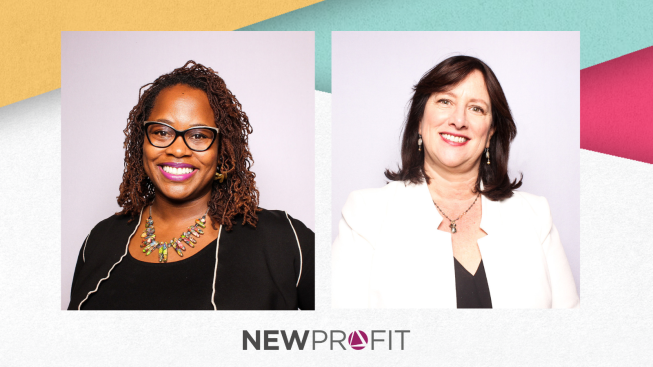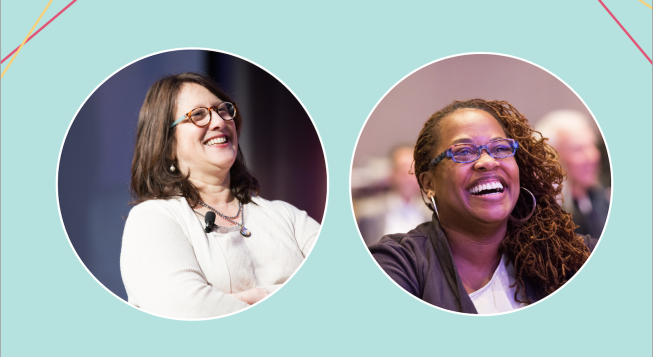One Year of Collaborative Leadership at New Profit

By Tulaine Montgomery and Vanessa Kirsch
A year ago, New Profit announced our decision to adopt a formal co-leadership structure. While our partnership has been many years in the making, our relationship as Co-CEOs started at a unique moment for New Profit and America as a whole. Between the pandemic, a racial reckoning, and a country increasingly fragmented across identity and ideology, we were — all of us — inundated by a storm. But this storm cleared the way to build something new and it enabled us to think in a much more generative way about our leadership at New Profit.
Organizations of all types and sizes have adopted the Co-CEO model for a number of reasons, including to increase leadership capacity, allow for specialization and, in some cases, advance DEI strategies. For us, though, the decision to lead New Profit together was rooted in our deep belief in the power of proximity. We saw how two leaders working together — bringing together different identities, experiences, and expertise — could shift how a philanthropic organization operates, which organizations it supports, and whose ideas get heard. Together, we could generate a collective empathy exponentially greater than on our own, expanding the universe of what we were able to relate to and what we were able to imagine was possible. In doing so, we could greatly deepen the impact of our work.
What we’ve seen over the past year confirms this hypothesis. Our partnership has enabled us to get closer to different people, issues, and ideas. It has reduced what we on our own might be inclined to dismiss. It has enlarged the space we can hold for our partners, constituents, and colleagues, and their perspectives and ideas. And, it has increased our willingness to do the things that seem the hardest because it has made us braver than we are on our own.
To be sure, some people might dismiss the idea of a Black woman and a White woman working together in true partnership. But we actively choose to ignore the noise because we made intentional commitments not to replicate the injuries and indignities that have been assigned to us based on our race and gender identity. We consciously hold space for each other’s complete humanity and are vigilant about protecting and restoring our empathy for each other.
We’ve also seen how increased empathy and courage can multiply impact. This year, we’ve raised more money, will have invested in more entrepreneurs, and done more to change the culture of philanthropy than at any other point in our history.
We radically altered the composition of our portfolio — moving a needle other foundations have been talking about unsticking for decades. Two years ago, organizations led by people of color accounted for 30% of our grantees. That proportion is now 80%. But not only are we changing the racial makeup of our portfolio, we are advancing a more expansive way of thinking about proximity that helps us identify the assets, expertise and solutions with the greatest potential to transform systems. We’ve already backed 60 entrepreneurs in our Proximate Capital Fund, and are rapidly increasing the number of leaders in our portfolio who are closest to the communities they serve.
The power of proximity doesn’t end with our leadership model. Our nation is fragmented. We increasingly don’t know one another. We’ve become so focused on taking sides and choosing lanes, we’ve forgotten how to get closer to each other and solve problems collectively. Our muscles for empathy, collective design and action are atrophying. Proximity is the antidote, mentally, spiritually, and even physiologically. Together, we are healthier and stronger. Imagine what is possible for all of us if we do this work together.
Over nearly 25 years, we’ve learned that it’s not just what we do, but how we do it. Since our founding, we’ve been committed to, and advocated for, providing unrestricted capital and putting trust in leaders and communities with lived experience and proximate expertise. Today, we’re committed to advancing collaborative models of leadership across our organization — to ensure we can drive this approach grounded in empathy, proximity and trust forward more powerfully for the next 25 years.

